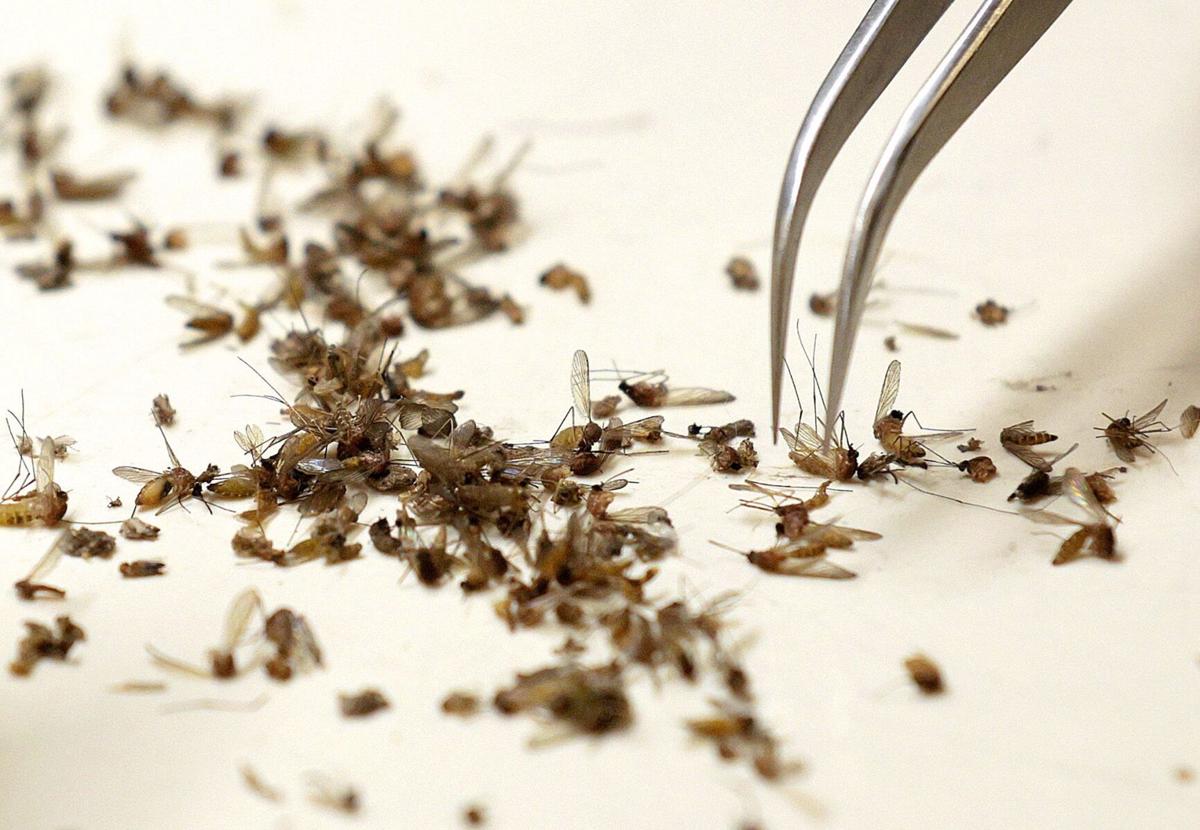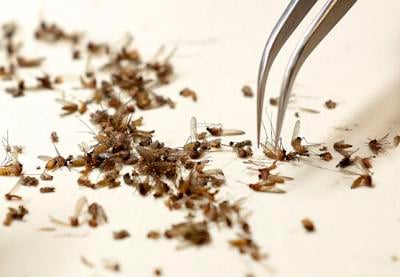Experts are warning that mosquito monitoring in Missouri is inadequate, days after the first bad case of the West Nile virus this year was discovered in Illinois.
Illinois authorities announced this week that a person had been hospitalized with West Nile in Wayne County, in Southern Illinois. It’s the state’s earliest identification of the virus in humans in almost a decade — West Nile’s peak season typically starts in August.
Most Missouri counties, however, aren’t testing mosquitoes for West Nile, state officials said. And that makes experts worry.
“Less surveillance will mean less ability to identify regions in Missouri where the virus may be circulating,” said Washington University medical school professor Michael Diamond, who studies the virus and how it harms humans.
Local authorities, meanwhile, are carefully watching how this summer’s mosquito season is shaping up.
People are also reading…
James Sayers, environmental manager for ӣ����Ƶ County’s Vector-Borne Disease Prevention Program, said mosquito numbers this summer will depend on the weather — if it continues to be hot with some rain, the numbers will climb. So far, he said, counts are slightly above average.
Some have warned that local tornado-damaged neighborhoods add piles of debris where rainwater can pool, creating more breeding grounds.
And a bite from the wrong mosquito can transmit West Nile virus, which can be a nasty disease. One in five people infected develop a fever, headaches, body aches, joint pains, vomiting, diarrhea or rash. About one in 150 may be infected in their brain, spinal cord or nerves, which can paralyze or even kill patients.
Last year, the disease paralyzed a teen from Hazelwood and killed a Lincoln County resident, the only death reported in Missouri that year.
It killed 13 people in Illinois, the highest number since 2018.
A spike in West Nile
The virus hasn’t been detected this early in the year for nearly a decade in Illinois.
“The fact that we are seeing the first human case of West Nile virus so early in the season serves as a timely reminder — especially for seniors and those with weakened immune systems — to protect yourself from illnesses caused by mosquito bites,” Illinois Health Department Director Dr. Sameer Vohra said in a press release.
The virus has been spreading in Illinois in recent years. In 2022, there were 40 counties where mosquitoes tested positive for West Nile, according to the state. In 2023, there were 50 counties; in 2024, 60.
Wayne County health officials detected West Nile in mosquitoes for the first time last August.
The Illinois Department of Public Health said it provides $2.8 million in funding to the state’s 97 local health departments for “vector surveillance and control activities” — monitoring and exterminating organisms that carry disease.
In Missouri, local health departments are self-funded for mosquito control and surveillance — the state doesn’t pay for the work, the state said. Just three of the state’s 115 local health departments, in Jefferson, St. Charles and ӣ����Ƶ counties, routinely test mosquitos for West Nile.
And just Jefferson and ӣ����Ƶ counties detected West Nile in mosquitoes last year.
In 2024, ӣ����Ƶ County analyzed 572 traps full of mosquitoes throughout the county and found 124 of them, or 22%, to be positive for the virus between June and September.
In Lincoln County, where one died last year from West Nile, health department officials worry about diseases spreading, but said the department doesn’t monitor or spray for mosquitoes.
“Unfortunately, our agency doesn’t do any mosquito control,” said department public information specialist Sarah Valenza. “We haven’t had the budget for it in the past.”
Experts say testing matters
Nicole Schoenborn, public health administrator for Wayne County, said mosquito testing allows the county to send specific warnings in social media posts, local media and posters to residents when mosquitoes test positive.
“It lets people know that we have mosquitoes bearing diseases in the community,” she said.
“When people know it’s been detected locally they take it more seriously,” she continued.
People then often call them asking how to kill mosquitos on their property, she said. Residents are more likely to wear repellent and long sleeves. If they get sick, they may be more likely to ask their doctors about the virus. And their doctors may be more likely to connect the dots and say, “Maybe we should test for this.”
Diamond, the WashU professor, said that if Missouri had a better handle on West Nile infections in mosquitos of a given area, it could warn locals of the risk so residents could better protect themselves and officials better target spraying.
In counties where surveillance is not conducted, the timing of anti-mosquito activities might be off, and “this has implications for how many humans might become exposed, get infected and develop disease,” he said.
Sayers, the ӣ����Ƶ County official, said mosquito surveillance “is really important.” It lets them know where to target the adult mosquitos with sprays and to avoid spraying indiscriminately, which wastes money.
Indiscriminate spraying can also lead to pesticide resistance in mosquitos, he said. “If you’re continually spraying with the same chemical, that product will no longer be effective,” he said.
And he said that spraying mosquitoes without knowing where to target them “could have an impact on pollinators and beneficial insects as well.”
Some day, a vaccine against West Nile will likely be available.
Sarah George, a professor of infectious diseases at ӣ����Ƶ University, is developing one now.
“It’s a big logistical undertaking, cost dollars and you have to think it through,” she said. “But it can be done.”
Until there’s a West Nile vaccine, the city of ӣ����Ƶ recommends people remember “The 4 D’s”:
- Drain standing water in your yard each week.
- Dress in long-sleeved shirts and pants.
- Use DEET or other approved repellents.
- Spend less time outdoors at dawn or dusk.
Outdoor dining is a great way to enjoy the summer weather but pesky bugs can sometimes ruin the experience. So here are some easy and effective ways to keep bugs away when eating outdoors so you can enjoy your food in peace.



















